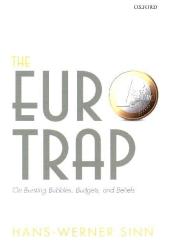 Neuerscheinungen 2017Stand: 2020-02-01 |
Schnellsuche
ISBN/Stichwort/Autor
|
Herderstraße 10
10625 Berlin
Tel.: 030 315 714 16
Fax 030 315 714 14
info@buchspektrum.de |

Hans-Werner Sinn
The Euro Trap
On Bursting Bubbles, Budgets, and Beliefs
2017. 416 p. w. 59 Figures and 5 Tables. 231 mm
Verlag/Jahr: OXFORD UNIVERSITY PRESS; OUP OXFORD 2017
ISBN: 0-19-879144-5 (0198791445)
Neue ISBN: 978-0-19-879144-7 (9780198791447)
Preis und Lieferzeit: Bitte klicken
This book offers a critical assessment of the history of the euro, its crisis, and the rescue measures taken by the European Central Bank and the community of states.
This book offers a critical assessment of the history of the euro, its crisis, and the rescue measures taken by the European Central Bank and the community of states. The euro induced huge capital flows from the northern to the southern countries of the Eurozone that triggered an inflationary credit bubble in the latter, deprived them of their competitiveness, and made them vulnerable to the financial crisis that spilled over from the US in 2007 and 2008. As private
capital shied away from the southern countries, the ECB helped out by providing credit from the local money-printing presses. The ECB became heavily exposed to investment risks in the process, and subsequently had to be bailed out by intergovernmental rescue operations that provided replacement
credit for the ECB credit, which itself had replaced the dwindling private credit. The interventions stretched the legal structures stipulated by the Maastricht Treaty which, in the absence of a European federal state, had granted the ECB a very limited mandate. These interventions created a path dependency that effectively made parliaments vicarious agents of the ECB´s Governing Council.
This book describes what the author considers to be a dangerous political process that undermines both the market economy and democracy, without solving southern Europe´s competitiveness problem. It argues that the Eurozone has to rethink its rules of conduct by limiting the role of the ECB, exiting the regime of soft budget constraints and writing off public and bank debt to help the crisis countries breathe again. At the same time, the Eurosystem should become more flexible by offering its
members the option of exiting and re-entering the euro - something between the dollar and the Bretton Woods system - until it eventually turns into a federation with a strong political power centre and a uniform currency like the dollar.
This detailed, heavily footnoted book by prominent German economist Sinn (Univ. of Munich) assesses the euro and the ongoing concerns about the economies of the euro-zone countries. He provides considerable data, often on individual countries (e.g., Greece, Ireland, Spain, and Italy), and retains a clear point of view on what occurred and why. J. E. Weaver, Drake University, CHOICE
Hans-Werner Sinn is Professor of Economics and Public Finance at the University of Munich, President of the Ifo Institute - Leibniz-Institute for Economic Research, Director of the University of Munich´s Center for Economic Studies, and President of CESifo. He is a member of the Council of Economic Advisors to the German Ministry of Economics as well as former president of the International Institute of Public Finance (IIPF) and of the Verein für Socialpolitik,
the association of German-speaking economists. He holds honorary doctorate degrees from the universities of Magdeburg, Helsinki, and the HHL Leipzig Graduate School of Management, and has been knighted with the Maximilian Order. He is the author of more than 20 monographs and 135 scientific articles. The
British newspaper The Independent nominated him as one of the "ten people who changed the world" in 2011. The German Business weekly Wirtschaftswoche ranked Sinn 62 among the 100 most powerful people in Germany.


